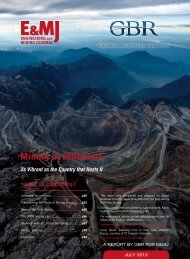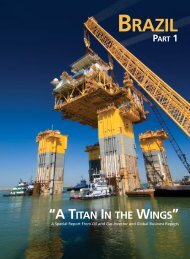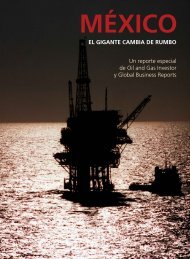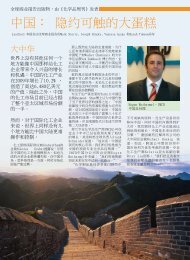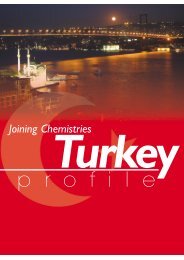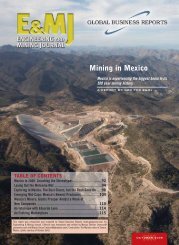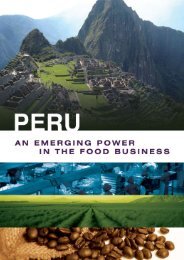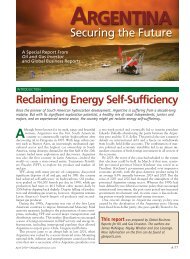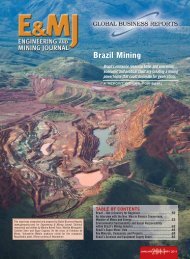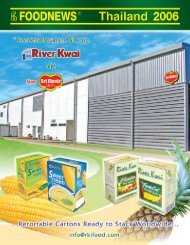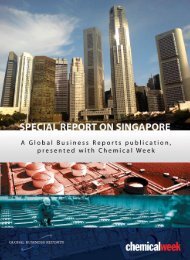Turkey Speciality Chemicals 2006 - GBR
Turkey Speciality Chemicals 2006 - GBR
Turkey Speciality Chemicals 2006 - GBR
You also want an ePaper? Increase the reach of your titles
YUMPU automatically turns print PDFs into web optimized ePapers that Google loves.
<strong>Turkey</strong> special report<br />
Russian market by establishing Kemipex to conduct its operation<br />
on the spot. With its rapidly expanding distribution network,<br />
Kemipex has made the Dyo brand a household name in<br />
Russia.<br />
Before Dyo conquers the regional paint market, it will have to<br />
reach the level of its main domestic competitor, Marshall Boya.<br />
Acquired in 1998 by Akzo Nobel, Marshall has become Europe’s<br />
sixth largest producer of decorative and professional paints.<br />
Integration into Akzo Nobel has given Marshall considerable<br />
comparative advantages. Acrylic isolation coatings, pigmented<br />
and transparent primers and silicone acrylic-based and<br />
acrylic copolymer-based coatings are some of its key speciality<br />
products.<br />
As with Dyo, Marshall has discovered potential markets in<br />
the Balkans, the Middle East and the former Soviet Union.<br />
Marshall’s production and logistics manager, Atilla Discioglu<br />
indicates, however, that the future lies in Iraq and Iran. The only<br />
impediments are political instability and logistics. Back in<br />
<strong>Turkey</strong>, the only obstacles to further growth are legislative.<br />
“Legislation”, Dr Ismail Yiginsu points out, “is not at EU levels.<br />
We apply all of the EU standards but are waiting for these<br />
to become commonplace here in <strong>Turkey</strong>”. Furthermore, environmental<br />
conditions in <strong>Turkey</strong> are iffy, to say the least. When<br />
the new legislation is espoused, he says, Marshall will be ready<br />
and a pioneer again.<br />
Nevertheless, the outlook is positive, since Marshall is wellestablished<br />
on the market and has 15,000 distribution points.<br />
Moreover, the company trains 6,000 professional painters<br />
every year to use their products. Discioglu himself says that<br />
Marshall is “thinking globally and acting locally”.<br />
Akzo Nobel’s acquisition activity in the Turkish market was<br />
not limited to Marshall, as it also established a joint venture with<br />
Kemipol Industries, an Izmir-based industrial coatings manufacturer<br />
specialising in the automotive sector, in 1990. Akzo Nobel<br />
Kemipol focuses on speciality coatings for construction materials,<br />
heavy agricultural equipment, metal furniture, domestic<br />
appliances, mirror coatings, non-stick coatings and industrial<br />
plastic components, automotive coatings and car refinishes.<br />
Headquartered in the same office in Izmir is Akzo Nobel<br />
Boya-Interpon, which was founded in 1999 to produce electrostatic<br />
thermosetting powder coatings. Production started in<br />
August 2000 and investment boosted capacity from 2,000 to<br />
7,000 tonnes/year by the end of 2003.<br />
Today, Interpon is one of the market leaders in epoxy powder<br />
coatings, epoxy-polyester powder coatings, polyester powder<br />
coatings and non-stick powder coatings for domestic appliances,<br />
building materials, automotive parts, industrial materials<br />
and functional materials.<br />
With Yasar, Dyo and Akzo<br />
Novel fighting it out in the<br />
construction, automotive and<br />
textiles sectors, Polisan, a<br />
member of the Polisan<br />
Group, has quietly succeeded<br />
in becoming one of<br />
<strong>Turkey</strong>’s leading paint, glue<br />
and resin producers.<br />
Via carefully planned<br />
investments, none of them<br />
from foreign sources, Polisan,<br />
has grown rapidly to the<br />
point where it can meet the<br />
sector’s raw material and speciality<br />
needs. It now offers<br />
decorative, furniture, industrial<br />
and heavy duty paints, as<br />
Growing demand for housing is driving the paints and<br />
costings sector<br />
well as primers, varnishes, thinners, formaldehyde resins and<br />
glues, among many other prodcuts.<br />
Recently, Polisan’s R&D department has concentrated on<br />
expanding its industrial products group, such as in formaldehyde<br />
and formaldehyde resins, alkyd resins and polymer emulsions<br />
for the textile, paper and wood sectors.<br />
Other key niches are urea, melamine and phenol formaldehyde<br />
resins for paper and fabric impregnation and paper lamination<br />
productions, water-based emulsions of vinyl acetate<br />
homopolymers stabilised with polyvinyl alcohol and surfactants<br />
that are used as back coating binders for the textile industry.<br />
<strong>Turkey</strong> is also home to many traders and agents from foreign<br />
companies that provide specialised paints and coatings. One,<br />
Ucgen Boya, which acts as an agent for Great Lakes, Johnson<br />
Matthey, Fine Organics and Nubiola, has managed to put<br />
together the most extensive range of pigments and polymer<br />
additives on the market and is now the third largest supplier of<br />
paints and pigments in <strong>Turkey</strong><br />
Organic, inorganic, effect and anti-corrosive pigments and<br />
pigment dispersions make up 75% of Ucgen’s product portfolio<br />
but, according to managing director Ulvi Ozguven, the<br />
remaining 25% of the portfolio, which encompasses polymer<br />
additives, is growing rapidly.<br />
Specialty products such as flame retardants, antioxidants,<br />
UV stabilisers, slip agents and antistatic agents are in greater<br />
demand. As the paints and pigments sector expands, customers<br />
are calling for higher quality products, which directly<br />
push the need for specialty additives. Ozguven says that flexibility<br />
and new products will help Ucgen to retain its role as<br />
front-runner in its business.<br />
Vibrant foreign trade<br />
Besides meeting the increasing domestic demand, the Turkish<br />
paints and coatings sector has recently tended to export more.<br />
The sector is developing its exporting capacity especially focusing<br />
on the Balkans, the Middle East, the former Soviet Union<br />
and East European countries after the crisis and stagnation period.<br />
<strong>Turkey</strong> now exports paints to over 80 countries.<br />
In 2004, the total value of paints and coatings exports<br />
reached €148.4 million, headed by paints and varnishes (€59.5<br />
million) and followed by putties, resin cements and other mastics<br />
(€22.6 million), synthetic tanning substances (€17.6 million),<br />
synthetic organic colouring matter (€14.3 million) and printing<br />
inks (€12.6 million).<br />
<strong>Turkey</strong>’s dyes, paints and coatings imports, meanwhile,<br />
totalled some €840 million in 2004, most coming from<br />
Germany, Italy, the UK, France, Belgium, China, Switzerland,<br />
Spain and India. The major import products are: synthetic<br />
organic colouring materials and other colouring materials, and<br />
paints and varnishes based on synthetic polymers or chemically<br />
modified natural polymers.<br />
The Turkish paints industry is expected to double in size<br />
within the next five years. With the construction and automotive<br />
sectors booming, the need for speciality products will be<br />
even greater. As the textile sector is saturated and beginning to<br />
shrink, with production moving to the Far East, textile dyes and<br />
chemicals producers will have to concentrate on high valueadded<br />
products to stay in business.<br />
With the economic crisis over and strong marketing and educational<br />
campaigns running, the opportunities are endless. As the<br />
legislation improves, unregistered paint manufacturers will be on<br />
the losing end, while the big players, many of them with foreign<br />
capital, will be able to strengthen their market positions.<br />
Consolidation of power at home will come through acquisitions<br />
and R&D. These strong brand names will then be able to travel<br />
abroad to pastures that could be just as green or even greener.<br />
64 January/February <strong>2006</strong> <strong>Speciality</strong> <strong>Chemicals</strong> Magazine<br />
www.specchemonline.com



